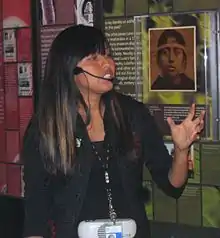Tour guide
A tour guide (U.S.) or a tourist guide (European) is a person who provides assistance, information on cultural, historical and contemporary heritage to people on organized sightseeing and individual clients at educational establishments, religious and historical sites such as; museums, and at various venues of tourist attraction resorts.[1]
- For the gadget, see wireless tour guide system.

History
.jpg.webp)
In 18th-century Japan, a traveler could pay for a tour guide or consult guide books such as Kaibara Ekken's Keijō Shōran (The Excellent Views of Kyoto).[2]
Description

The CEN (European Committee for Standardization) definition for "tourist guide" – part of the work by CEN on definitions for terminology within the tourism industry – is a "person who guides visitors in the language of their choice and interprets the cultural and natural heritage of an area, which person normally possesses an area-specific qualification usually issued and/or recognized by the appropriate authority".[3] CEN also defines a "tour manager" as a "person who manages and supervises the itinerary on behalf of the tour operator, ensuring the programme is carried out as described in the tour operator's literature and sold to the traveller/consumer and who gives local practical information".[4]
In Europe, tourist guides are represented by FEG, the European Federation of Tourist Guide Associations https://www.feg-touristguides.com/cen_definitions.php. In Europe, the tourist guiding qualification is specific to each and every country; in some cases the qualification is national, in some cases it is broken up into regions. In all cases it is embedded in the educational and training ethic of that country. EN15565 is a European Standard for the Training and Qualification of Tourist Guides.
In Australia, tour guides are qualified to a minimum of Certificate III Guiding.[5]]. They belong to a couple of organisations, notably the Professional Tour Guide Association of Australia [PTGAA] and Guides of Australia [GOA].
In Japan, tour guides are required to pass a certification exam by the Commissioner of the Japan Tourism Agency and register with the relevant prefectures. Non-licensed guides caught performing guide-interpreter activities can face a fine up to 500,000 Yen[6]
In India its mandatory to own the license approved by the Ministry of Tourism (India) to work officially as a tourist guide. The government provides the license to regional level tour guide and also runs a Regional Level Guide Training Program (RLGTP). These programs and training sessions are conducted under the guidance of Indian Institute of Tourism and Travel Management (IITTM) or other government recognized institutes.[7]
In South Africa tourist guides are required to register in terms of the Tourism Act 3, 2014. Training must be done through a trainer accredited by the Culture, Arts, Tourism, Hospitality and Sport Sector Education and Training Authority.[8]
See also
References
- On the Job: A Seasoned Tour Guide Tells All, JobMonkey.com.
- Berry, Mary Elizabeth (2006). Japan in Print Information and Nation in the Early Modern Period. Berkeley, California: University of California Press. pp. 185–190. ISBN 9780520254176.
- "EN 15565 2008 Standard for the Training and Qualification of Tourist Guides..." World Federation of Tourist Guide Assiciations. Retrieved 15 May 2017.
- "EN 15565 2008 Standard for the Training and Qualification of Tourist Guides..." World Federation of Tourist Guide Associations. Retrieved 15 May 2017.
- "Certificate III Guiding". Retrieved 1 October 2019.
- "Tour Guides and Staff". Japan Deluxe Tours. Retrieved 22 May 2017.
- "How to become tourist guide in India?". 2018-05-15.
- "Registration as a Tourist Guide". www.westerncape.gov.za. Western Cape Government. Retrieved 1 October 2019.
Notes
- Salazar, Noel B. (2005). Tourism and glocalization: ‘Local’ tour guiding. Annals of Tourism Research, 32(3), 628-646.
- Salazar, Noel B. (2006). Touristifying Tanzania: Local guides, global discourse. Annals of Tourism Research, 33(3), 833-852.
- Salazar, Noel B. (2008). "Enough stories!” Asian tourism redefining the roles of Asian tour guides. Civilisations, 57(1/2), 207-222.
- Salazar, Noel B. (2010). Envisioning Eden: Mobilizing imaginaries in tourism and beyond. Oxford: Berghahn.
Further reading
- MacCannell, Dean. The Ethics of Sightseeing. University of California Press, 2011.
- Pond, Kathleen Lingle. The Professional Guide: Dynamics of Tour Guiding. New York: Van Nostrand Reinhold, 1993.
- Ruitenberg, Claudia W. "Learning by Walking: Non-Formal Education as Curatorial Practice and Intervention in Public Space." International Journal of Lifelong Education 31, no. 3 (2012): 261-275.
- Wynn, Jonathan R. The Tour Guide: Walking and Talking New York. Chicago: The University of Chicago Press, 2011.
- Wynn, Jonathan R. "City Tour Guides: Urban Alchemists at Work." City & Community 9, no. 2 (June 2010).
External links
| Wikimedia Commons has media related to Tour guides. |
